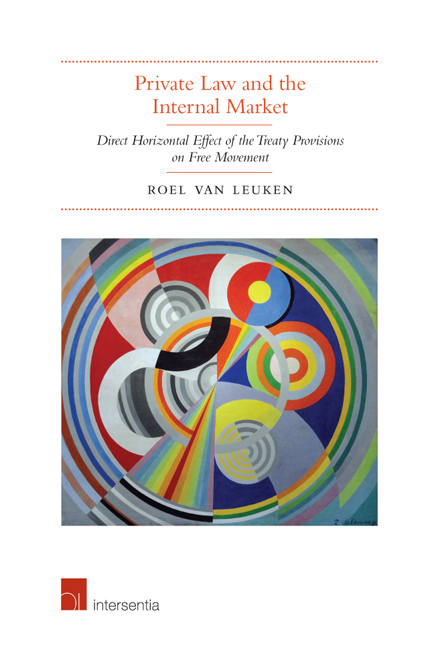 Private Law and the Internal Market
Private Law and the Internal Market Book contents
- Frontmatter
- Preface
- Contents
- Table of Cases
- List of Abbreviations
- Chapter 1 Introduction
- Part I Direct Horizontal Effect: Concept and Application in Competition Law
- Part II Direct Horizontal Effect: Internal Market
- Chapter 4 Fundamental Freedoms: Content of the Prohibitions
- Chapter 5 Case Law on Direct Horizontal Effect of Articles 45, 49 and 56 TFEU
- Chapter 6 Case Law on Direct Horizontal Effect of Articles 34 and 35 TFEU
- Chapter 7 Case Law on Direct Horizontal Effect of Article 63 TFEU
- Part III Justifications
- Bibliography
- Index
Chapter 5 - Case Law on Direct Horizontal Effect of Articles 45, 49 and 56 TFEU
from Part II - Direct Horizontal Effect: Internal Market
Published online by Cambridge University Press: 27 September 2018
- Frontmatter
- Preface
- Contents
- Table of Cases
- List of Abbreviations
- Chapter 1 Introduction
- Part I Direct Horizontal Effect: Concept and Application in Competition Law
- Part II Direct Horizontal Effect: Internal Market
- Chapter 4 Fundamental Freedoms: Content of the Prohibitions
- Chapter 5 Case Law on Direct Horizontal Effect of Articles 45, 49 and 56 TFEU
- Chapter 6 Case Law on Direct Horizontal Effect of Articles 34 and 35 TFEU
- Chapter 7 Case Law on Direct Horizontal Effect of Article 63 TFEU
- Part III Justifications
- Bibliography
- Index
Summary
INTRODUCTION
Although within the general scheme of the Treaty the provisions on free movement of workers, freedom of establishment and freedom to provide and receive services were intended as prohibitions addressed to the Member States, there is now no longer any doubt that Articles 45, 49 and 56 TFEU are also binding on individuals. It is not clear, however, how far their so-called ‘direct horizontal effect’ extends or may come to extend. This chapter seeks to bring clarification.
Sections 5.2. and 5.3. will discuss, in chronological order, the judgments in which the Court of Justice has ruled on direct horizontal effect of the prohibitions on discrimination and restrictions laid down in Articles 45, 49 and 56 TFEU. This is followed in section 5.4. by an analysis of the arguments underlying this case law. The results of this analysis form the basis for a discussion in section 5.5. of the direction in which the case law regarding direct horizontal effect of Articles 45, 49 and 56 TFEU can be expected to develop.
CASE LAW ON DIRECT HORIZONTAL EFFECT OF THE PROHIBITIONS ON DISCRIMINATION IN ARTICLES 45, 49 AND 56 TFEU
WALRAVE AND KOCH (1974)
Bruno Walrave and Norbert Koch were two Dutch nationals who participated as professional pacers in motor-paced track cycling competitions. A characteristic feature of such competitions was that a cyclist followed a derny rider (the pacer), who created a slipstream and thus enabled the cyclist to reach very high speeds. Official races were organised by national cycling associations under the auspices of the coordinating international cycling union (Union Cycliste Internationale, UCI).
Towards the end of 1970 the UCI decided to change the regulations for the world championships in track cycling: henceforth, pacer and cyclist were required to have the same nationality. Because Walrave and Koch considered this new rule to be ‘a threat to their livelihood or in any case a serious reduction in the size of the market in which they [could] sell their skills’, they applied for a declaratory judgment that the new UCI rule was null and void because it infringed EU law, specifi cally the Treaty provisions on free movement of workers (Article 45 TFEU, ex Article 48 EEC) and free movement of services (Article 56 TFEU, ex Article 59 EEC).
- Type
- Chapter
- Information
- Private Law and the Internal MarketDirect Horizontal Effect of the Treaty Provisions on Free Movement, pp. 63 - 114Publisher: IntersentiaPrint publication year: 2017


